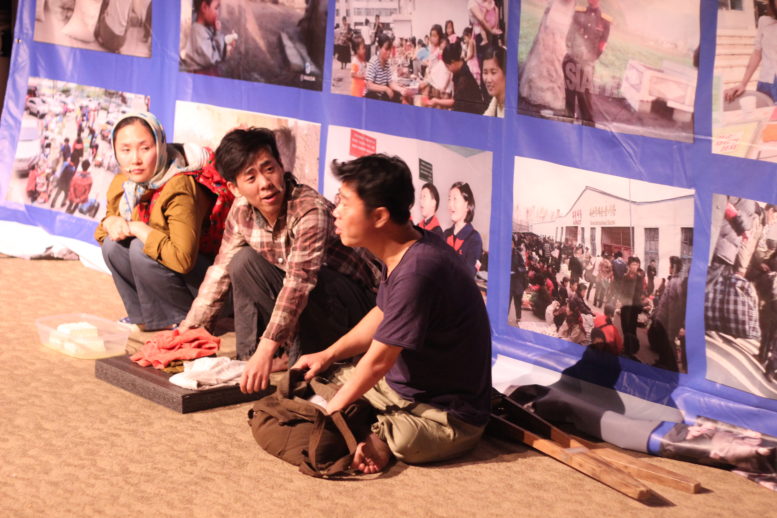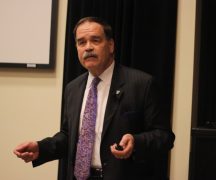By DAVID DUPONT
BG Independent News
The scene acted out by eight defectors from North Korea left some, including the director, wiping tears from their eyes.
A younger brother knelt by his dead sister pleading for her not to leave him alone. Over and over, he cried out, until another character came and led him off. Maybe they would cross the Tumen River into China, and maybe from China finally reach South Korea.
As emotionally wrenching as the 20-minute drama was, the reality is worse, said Taejoon Choi, one of the actors. The audience saw “just a glimpse” of a situation “more serious and severe.”
The cast members are not professional actors. They are victims of the North Korean regime who have made that journey to refugee camps in China, where further hardship and abuse awaits them, and finally to South Korea.
This was not fiction. This was their lives, and continues to be the reality for those who remain in North Korea.
The mission of the troupe from NAUH International is to expose the harsh realities under which people live in North Korea. As part of that mission the troupe visited Bowling Green State University Wednesday night to present “Kotjebi: We Are Happy.”
The play takes place in the market, Jangmadang, where the casual brutality of life under despot Kim Il-sung plays out.
A mother played by Gunjn Ju, sells homemade tofu to feed her two children. She is joined by a schoolboy played by Taejoon Choi. His father has died because of the famine, now his mother is dying because of typhoid. He is selling his father’s clothes to fulfill his mother’s last wish – to have an apple.
Around them swirl the kotjebi, children who beg and steal to stay alive, as well as a security officer and the son of a government leader, who mocks their poverty.
One beggar steals some of the tofu, and shamelessly eats it. Played by Choonbeom Lee, the beggar is driven by desperation beyond the bounds of empathy. He even steals bread from a dying girl, someone no better off than him.
When the policeman (Shiwoo Choi) rounds up the beggars and forces them to sing about how happy they are, and beats them when their singing lacks joy.
This is what drove the eight actors from their homeland.
But Gunjn Ju said, speaking as did the other actors through translator Soojung Hong, the conditions in China were horrible. “Human trafficking was prevalent,” she said. “I gave birth to my two sons in China.”
Seongho Ji said that 10,000 North Koreans are victims of human trafficking.
Choonbeom Lee said that as a child he saw many of his friends’ parents die from starvation leaving their children to beg to survive. When he was 14 the government launch the arduous march campaign. This led to him fleeing to China at 14.
“Without citizenship I was always worried about being arrested,” he said, and then being sent back to North Korea. So he slept three or fewer hours a night.
Those who were returned to North Korea were sent to labor camps, and certain death.
Seongho Ji said that what they would want is for China to make it easier for the North Koreans to reach South Korea. They do not want to become Chinese citizens, just to get to South Korea.
There they live a life previously, unimaginable. They are able to go to school. They don’t have to beg for food.
Gunjn Ju said in the six years she lived in China “I was helped by a lot of Chinese people.”
She said she’d like to see China cooperate more with non-governmental groups assisting the refugees.
Spreading information about life free of the Kim regime’s grip is why NAUH was formed by North Korean exiles and South Korean college students.
NAUH sends that news through radio broadcasts. Others like Seongho Ji’s character smuggle in DVDs, CDs and flash drives. “The Kim regime doesn’t want its people hearing about people living free lives,” he said.
While those in the United States worry most about North Korea’s nuclear weapons, those in North Korea are more concerned about starvation, he said. Seongho Ji said he didn’t expect the regime to be willing to give up its arsenal because it believes it gives North Korea greater standing within the international community and is a source of national pride.
While North Koreans are taught to hate Americans – children play kill the Americans at recess – the actors have been touched by the reception they have received.
Eileen Cherry-Chandler, an associate professor in the BGSU Department of Theatre and Film, said she found the play moving, and the actors “courageous.”
As her words were translated, smiles washed over the faces of the actors.
The director, Terry Eom, who is from South Korea, said she didn’t know how many people to expect at the performance. Seeing the packed theater in the student union was “like a miracle.”
Reliving the hardships of living in North Korea is hard Gunjn Ju said. “Every time I do this it is heart-breaking.” But then she remembers how hard it is for those left behind in the north and realizes the pain is worth it.
Choonbeom Lee agreed the performances can be emotionally difficult. “I decided to overcome the trauma and help others understand they can get over the trauma and get the message out to the world.”


